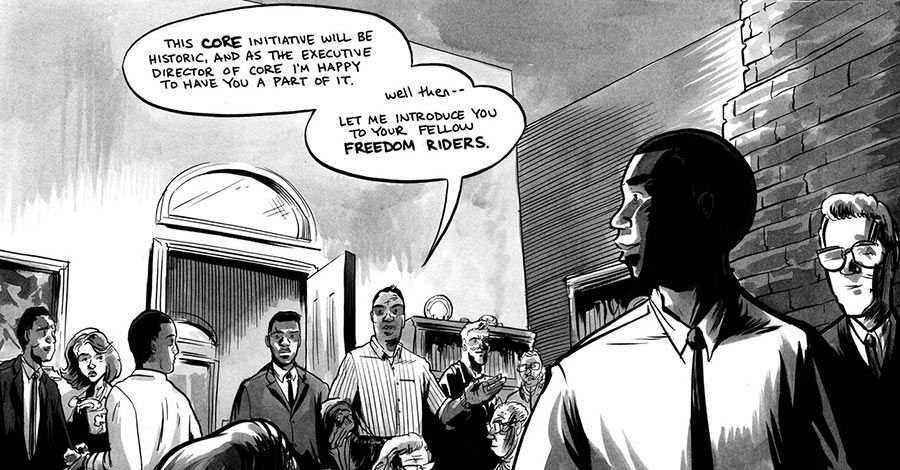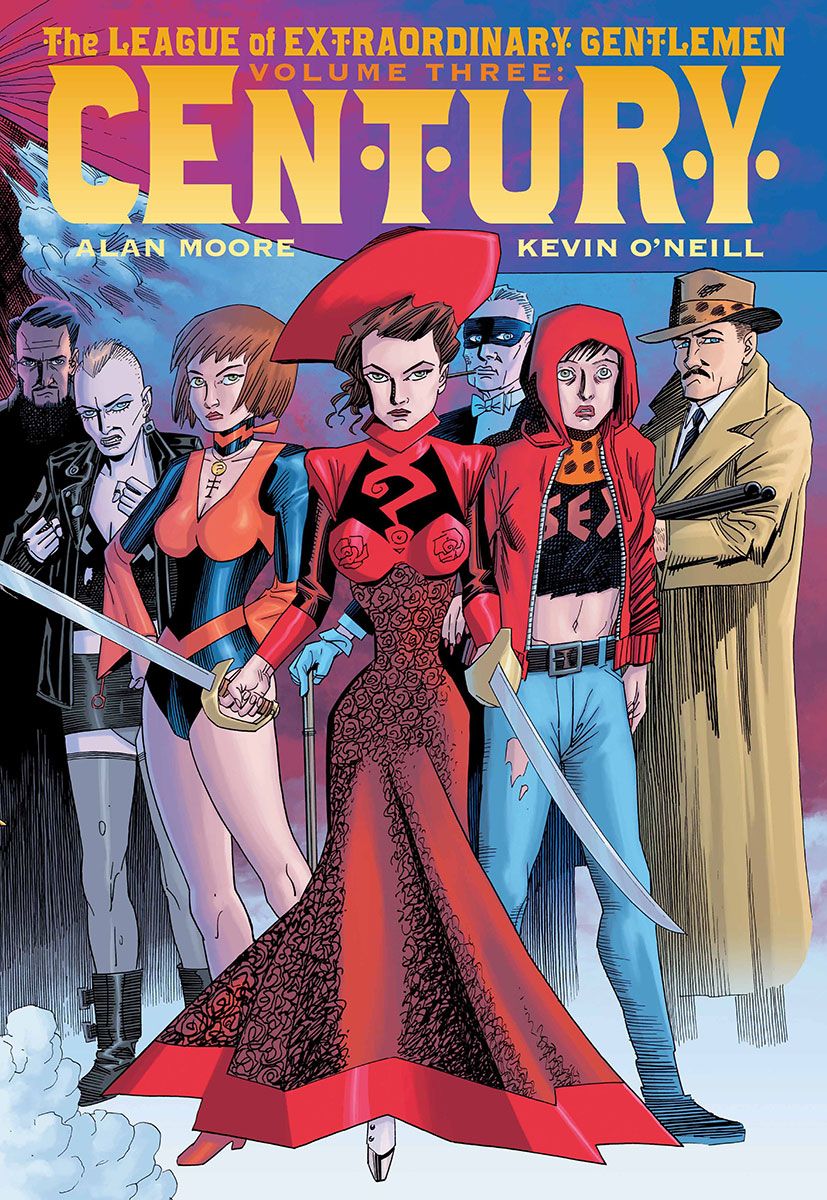At last year's Comic-Con International in San Diego, Top Shelf kicked off what would amount to a whirlwind media tour around their book "March: Book One." Written by Congressman John Lewis and his aide Andrew Aydin with artwork by Nate Powell, the "March" trilogy gives Lewis' firsthand account of the civil rights movement.
"If anyone was at the panel last year, I think the best way to describe myself was as a giggling fanboy, shocked to be on stage," Aydin told fans attending Top Shelf's panel at Comic-Con International 2014. "Nate had the professionalism and decorum of having done this before. Right now I'm just glad not to be in Washington, which is a retched hive of scum and villainy."
In what could be considered a victory lap, Aydin and Powell returned to San Diego this year to share stories and pictures from their crazy year, which included appearances on "The Rachel Maddow Show" (she told Powell she was a "big fan" and had read all his graphic novels) and phone calls from Ethel Kennedy when the book received special recognition at the 2014 Robert F. Kennedy Book Awards. They also discussed their progress and artwork from the upcoming "March: Book Two."
Hosted by Leigh Walton, Top Shelf marketing director, the panel included Aydin and Powell, who were later joined by "League of Extraordinary Gentleman" artist Kevin O'Neill to discuss his work with writer Alan Moore on that series, as well as the spinoff books featuring the daughter of Captain Nemo. Chris Ross, director digital publishing, rounded out the crew on stage.
Powell said that last year's convention was the first time he realized the scope of what they were working on. "It took a while, but all of a sudden it dawned on me that this was something that was in a completely different category and a completely different scale than any other book I'd ever been a part of."
Aydin relayed a story about a reporter who said he gave "March: Book One" to his nine year old. "'Now he's put on his Sunday suit and is marching around the house demanding equality for everyone,'" Aydin said. "It was one of those moments when you realized you were doing something special."
Adding to the book's accolades, Walton said "March: Book One" has been selected by Michigan State University, Marquette University and Georgia State University as their first-year book, meaning the graphic novel was given to incoming freshman to read this summer before school starts in the fall.
Aydin and Powell then spoke about Book Two, which Powell said would be "darker, and more intense, and more brutal" than the first book. It picks up a few months after Book One.
"We pick up again in fall of 1960 with something called Operation Open City and the standing campaigns," Aydin said. "The standing campaigns are to desegregate theaters and more formal restaurants. We actually open with a scene in a Krystal Burger -- not to spoil it -- but they get fumigated. They're sitting at the lunch counter, and rather than asking them to leave ... they simply lock the doors and turn on a fumigator, which is used to kill rodents and pests. It's a fitting symbol of exactly how some of these people saw the protesters and what they were up against."
The book will also include Lewis' perspectives on the Freedom Rides, a group of protestors who rode interstate buses into the South after the United States Supreme Court declared segregated buses unconstitutional. It'll also cover the congressman's 37 days in Parchman Penitentiary after being arrested for using a "white" restroom, as well as his participation in the famous 1963 March on Washington.
Aydin said that while the march itself wasn't violent, it did spark brutally violent reactions in the months that followed. Although Powell said he was only halfway done with the book, he had already drawn at least three different scenes that detailed three murder attempts on Lewis -- some of which, he said, were so disturbing that he had to quit drawing for the day to clear his mind once they were done.
"Most of us who are cartoonists are no strangers to depicting violence in a particular context," Powell said. "I don't want to say I'm pleasantly surprised, but it's kind of refreshing to discover that I've been completely re-sensitized to depictions of violence while drawing this book."
Powell went on to describe a scene he called "the most disturbing thing I've ever drawn." It involved the brutal beat down of the Freedom Riders in Montgomery, Alabama that involved a man holding down another man and encouraging his own toddler to claw the guy's eyes out.
"There are moments when I'm depicting a lot of over-the-top violence in 'March' when I have to be careful not to slip into a visual shorthand that reminds us a little too much of a zombie attack," Powell said. "But what's interesting about the escalation of violence in the events depicted in March 2 -- for example, the Montgomery Greyhound Station Massacre - I stopped avoiding the echoes and references to a zombie attack. It's like people choosing to leave a degree of their humanity behind is almost virtually indistinguishable from a zombie attack in some cases."
Making his first Comic-Con appearance since "The League of Extraordinary Gentlemen" film came out, O'Neill discussed the origins of the "League" and how he came to work with Moore. He said he and Moore's relationship has always been very natural, noting that they are the same age, have the same sense of humor and a similar working-class background. Before The League, there was a range of books the duo had planned to work on, but something always prevented it from happening.
O'Neill said the original plan was to do "one series and then we're out of there," but the first series ended up being split into two volumes. The plan was to take some time off after that, but a conversation with Moore led to what would become "The Black Dossier."
"I made some quip about being unemployed," O'Neill said. "And he rang the next day and said that he felt so guilty at the thought of me standing there in the street, begging for small change, he couldn't take it. So he said, 'Why don't we do a sourcebook?'"
"The Black Dossier," in turn, triggered the time-travel aspects of later volumes, which meant they could keep "going and going and going," O'Neill said. "Alan has the whole story in his head, every detail, every character, every relationship, every obscure bit of information - it's in his head. It's not written down. If anything ever happens to him, we're screwed," O'Neill joked.
He then told the story about how he first learned he was working on "League of Extraordinary Gentleman" - from someone at a comic shop, who had heard he was working with Alan Moore on it. "I knew nothing about it, absolutely nothing about it," O'Neill said. "But I spoke to Alan a couple weeks later about something else, and at the end of the conversation he said, 'Oh, there's something you might be interested in ...'"
Walton pointed out the similarities between Powell and O'Neill's current projects - both draw on historical characters, whether fictional or real, and require a lot of research and drawing references. O'Neill said he likes to do research. "I learn new stuff as I go along," he said, noting that it's easier to reference old buildings in England because many of them are still standing. "In America ... everything gets torn down and rebuilt," he said, while in Britain, "we leave things up for 100 years."
The final "Nemo" book, subtitled "River of Ghosts," is due out from Top Shelf next March. It again focuses on Janni Dakkar, daughter of Captain Nemo, but is set in 1975 when she's 80 years old. "She's fading, seeing visions" O'Neill said, but she has some "unfinished business" on the Amazon River. He said there will be, "1970s hairstyle pirates," one "big new character" who "will be kind of a surprise for people, and a fair amount of violence."
Walton said it's pretty rare nowadays for an action comic to feature a character who is an elderly woman of color. "I don't know if we'll be filming it," O'Neill joked.
The panel ended with Ross discussing some of Top Shelf's recent digital projects, starting with "Motorcycle Samurai: Variable" by Chris Sheridan. The 82-page story received a special release at Comic-Con with several digital variant covers by Powell, Jeff Lemire, Van Jensen and Dusty Higgins, and more. The comic is now available on comiXology, Sequential and Thrillbent. In addition, Eddie Campbell's "Bacchus" has been released digitally on Top Shelf's site, comiXology and Sequential, and Top Shelf has added several new titles on their own site to their ever-expanding DRM-free library.


